Chinese and Russian narrative attacked US for supposedly prioritizing evacuation of military dogs instead of Afghans and other allies. Part two in a two-part series.
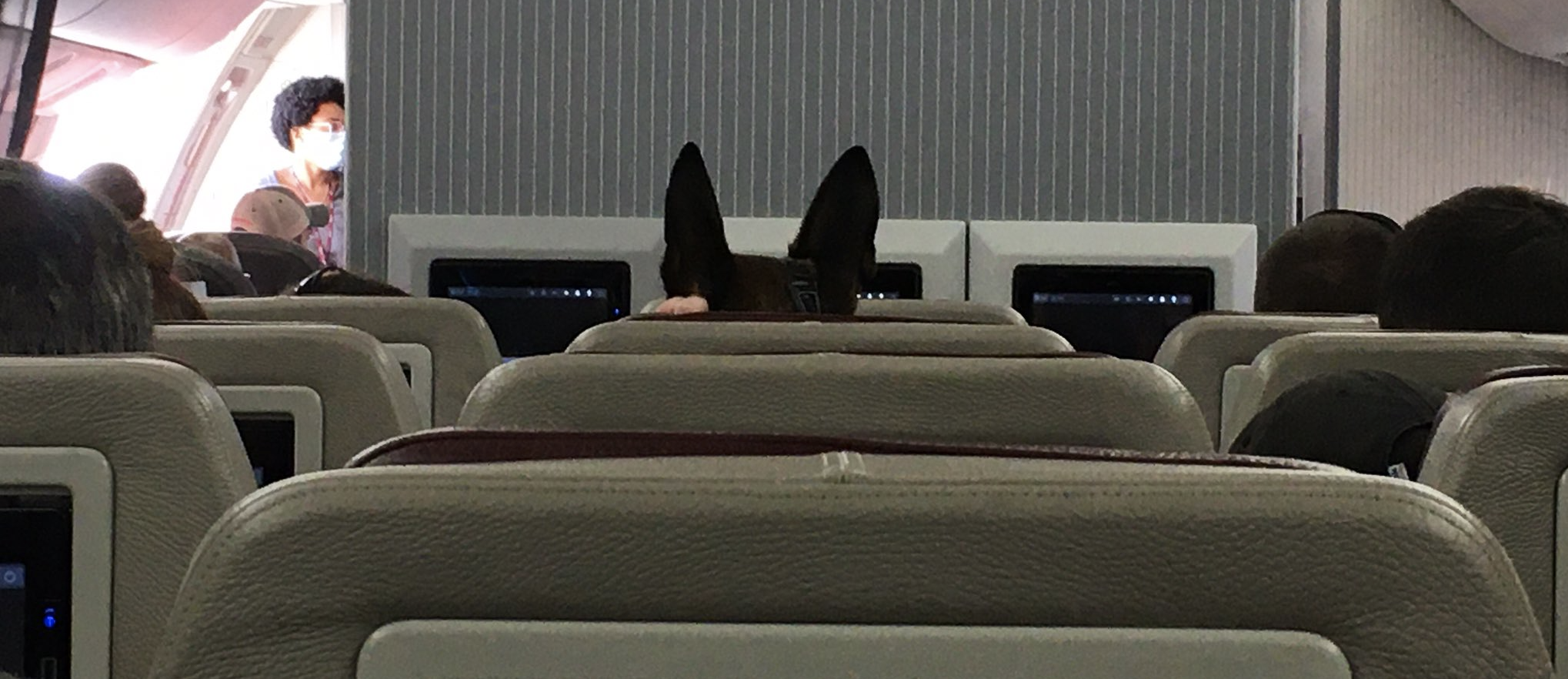
By Kenton Thibaut and Roman Osadchuk
As the DFRLab reported in its prior piece on Russian and Chinese responses to the US withdrawal from Afghanistan, both nations seized the opportunity to paint the United States in a negative light. In that case study, we focused on messaging presenting a US in decline. In this piece, we consider Russian and Chinese narratives regarding US hypocrisy over human rights and Afghanistan.
The second narrative highlighted the alleged “hypocrisy” of the US pushing a “human rights agenda” on the international stage, while engaging in supposedly “inhumane behavior” in Afghanistan. One key visual in this narrative push in both the Russian and Chinese information spaces was the use of images of the evacuation of US military service dogs before that of Afghan citizens as evidence of US hypocrisy on the issue.
Russia
Kremlin-aligned sources disseminated a story about the US military dogs evacuated alongside military personnel, claiming that the US military cares more about its dogs than the Afghans who worked with them. On August 16, multiple Kremlin-aligned outlets like RuBaltic, lenta.ru, and news-aggregator Rambler News, which reprinted Lenta’s story verbatim, claimed that “US troops evacuated dogs instead of Afghans” with slight variations in the headline. Two other media outlets — Moscow Komsomolets and Life — used a more subtle approach, comparing the dogs’ comfortable transfer from Kabul to the thousands of Afghans who later stormed Kabul airport in order to leave the country but who could not obtain seats on a departing airplane. The dogs had been evacuated on August 15 as the Taliban was in the process of taking control of Kabul.
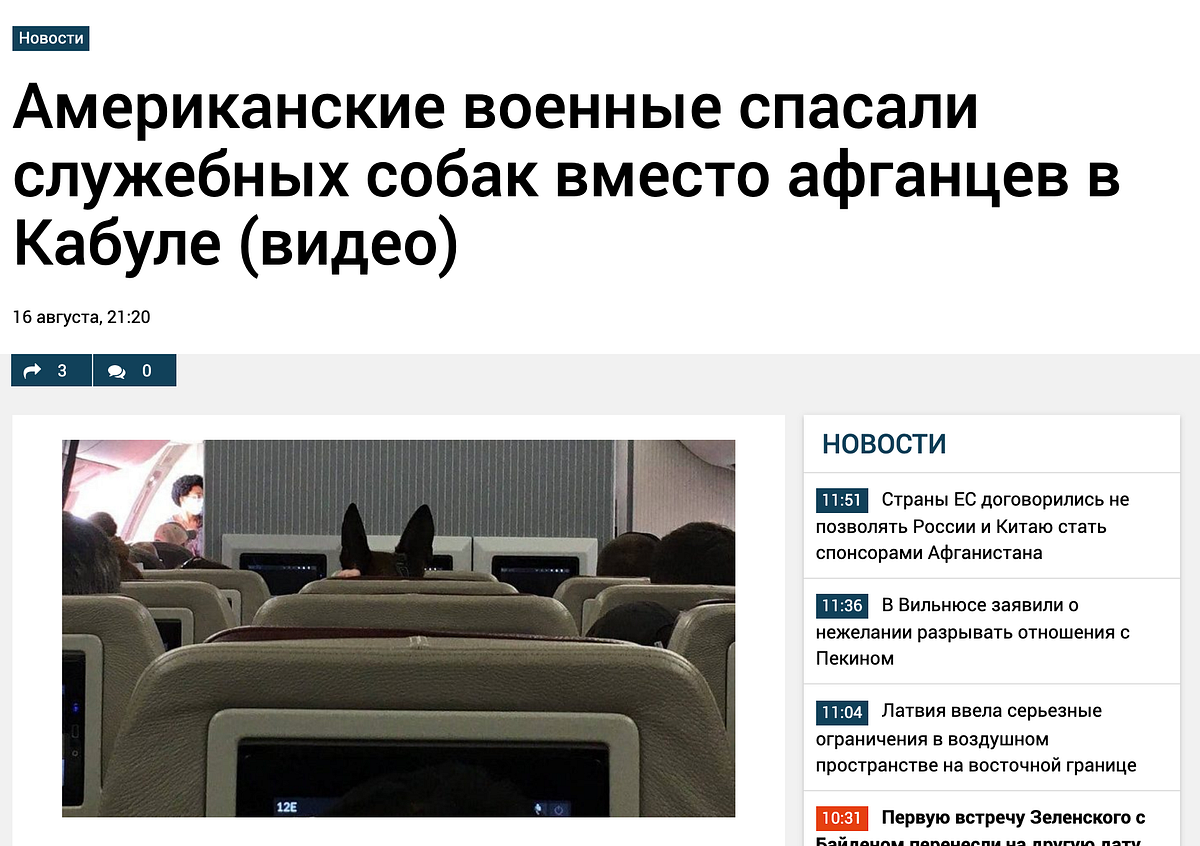
Similar articles appeared on social media and messaging platform Telegram, where journalists for Kremlin-owned media published their op-eds. For instance, Russia 24 anchor Stas Natanzon prepared a column for RT’s official Telegram channel in which he claimed that the footage from Kabul airport suggested that democratic ideals are empty: “For an American dog there is a seat on the plane, and for an Afghan child there is not even room in the aisle,” he wrote. The same Telegram channel also published a column with a similar premise written by Aleksandr Sladkov, a journalist with Kremlin-owned VGTRK. The publications were viewed 55,100 and 37,300 times, respectively. RT’s channel also published a short note on the dogs’ evacuation, contrasting it with the messages of Afghan crowds in the airport and news about the Afghans who fell from a departing plane after clinging to it.
Kremlin-owned and aligned media amplified another angle of the dogs’ evacuation. After the discovery of 12 Ukrainian military contractors stuck in Afghanistan, they wrote stories like “12 Ukrainian serviceman abandoned in the military base,” claiming that Ukraine or the United States forgot about or abandoned Ukrainian Armed Forces members in the country. Dmytro Kuleba, Ukraine’s Minister of Foreign Affairs, debunked the claim and clarified that the 12 Ukrainians were not part of the Ukraine Armed Forces but private citizens serving under an international contract with the United Nations. That, however, did not stop multiple social media posts that US troops value their dogs more than they value the Ukrainian military, a message designed to exacerbate the ongoing Ukraine-Russia conflict.
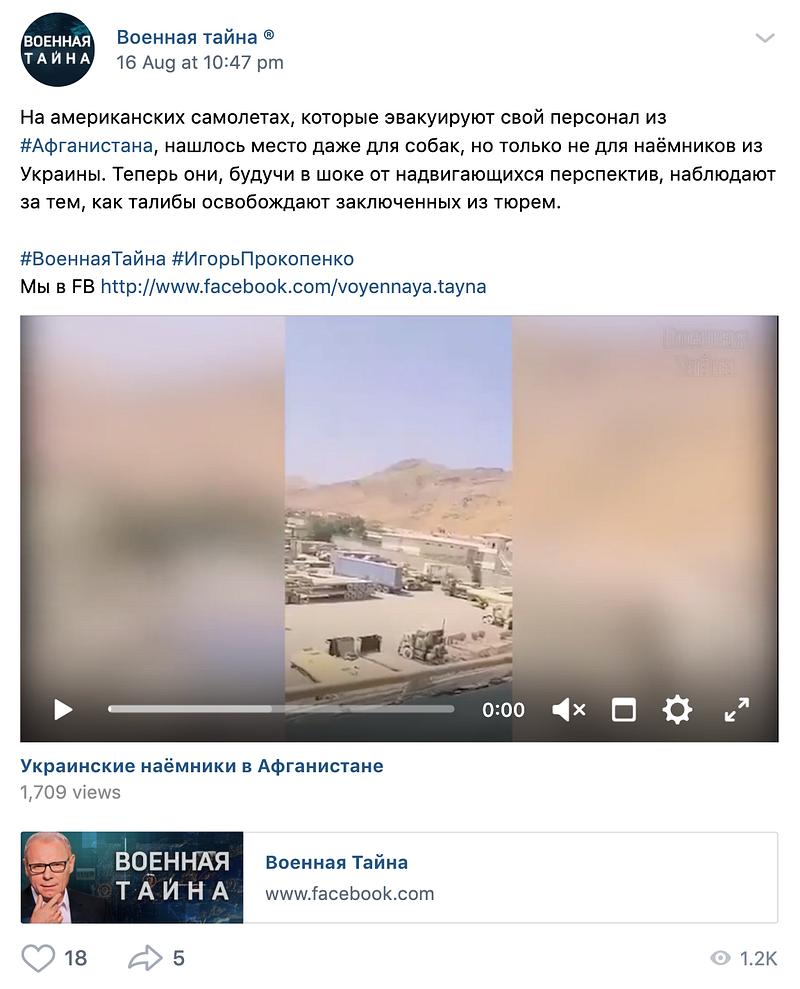
In related messaging, several fringe Telegram channels and multiple VKontakte pages also wrote about Germans that evacuated 22,000 liters of beer instead of Afghans. The Germans did in fact remove the beer but did so in June, two months before the events at the airport. The fringe sources claimed that this situation reveals the “real priorities” of Western democracies and how they treat their allies.
Fringe Kremlin-aligned media also amplified a tweet with a video by Aśvaka News Agency in which the account operator claimed without evidence that people were thrown from the plane in Kabul airport onto people’s houses. A few fringe Kremlin-aligned outlets as well as a few Ukrainian Telegram channels picked up the story, claiming that people “either fell off the plane or got thrown off it.”
Separately, Andrei Medvedev, a member of Moscow City Duma and a journalist at Kremlin-owned VGTRK, wrote on his Telegram channel that it did not matter whether “the person really fell out, or was thrown off the plane, or pulled out by a stream through the open hatch” as this unfortunate guy “thrown out like unnecessary trash” was now the new image of the United States. In another post, he wrote that the US believes that “they (Afghans) are not people. They’re wasted material. Some insects.”
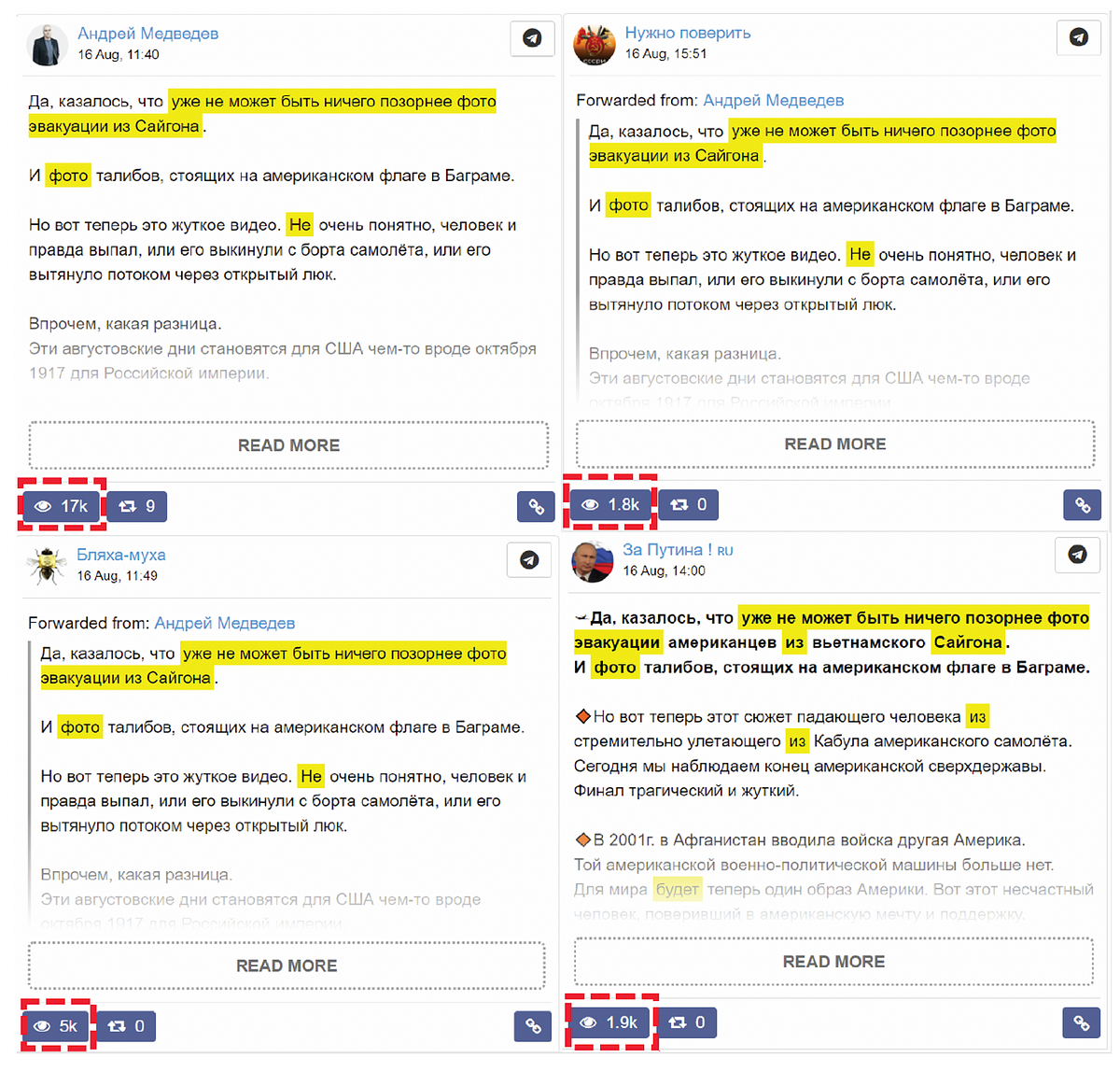
Elsewhere, Russian Ministry of Foreign Affairs Spokesperson Maria Zakharova also commented on the issue. In her remarks on Russia 24, she claimed that she was surprised that the United States could not confirm whether people fell off its airplanes while knowing everything from “Russian hackers to Novichoks.” “I think we will recall the footage from the Kabul airport every time to know the price to be paid for all their (American) concern for human rights,” she added.
China
Chinese officials and state-affiliated sources also seized upon the human rights narrative to undermine US leadership. Foreign Ministry spokesperson and leading “wolf warrior” Zhao Lijian repeated similar messaging in an August 18 press conference, stating with his characteristic flair that “some countries have carried out military interventions against sovereign countries under the banner of democracy and human rights” and that they should “immediately stop illegal military interventions and make practical efforts to maintain world peace and security and promote and protect human rights.” The ministry’s press statements were given prominence by People’s Daily, appearing on page 3 of the China edition and on the first page of the international edition, just below an article condemning the “politicization” of the pandemic. Separately, the Global Times English edition published several pieces with the theme of US human rights hypocrisy, with one headline stating, “Afghan refugee controversy reveals US real nature — duplicity and hypocrisy.” It also took US actions as evidence of the inevitability of Taiwan’s reunification with China, underscoring the fact that a capricious United States would not stay to ensure Taiwan’s security if it decided it was no longer in its interest to do so.
Meanwhile, on Chinese social media, CCP-owned Global Times posted videos of US military service dog evacuations through its Chinese-language Weibo account. CCP-affiliated groups picked up and amplified these images. For example, the Guangdong Communist Youth League, a CCP-affiliated organization, retweeted the Global Times video of the service dog evacuations with the comment, “Let the American dogs get out first!” The criticism over the service dogs evacuation is in part messaging designed to highlight US “hypocrisy” over Xinjiang and Washington’s purported championing of human rights, all while abandoning Afghans in favor of ensuring the safety of “American dogs.”
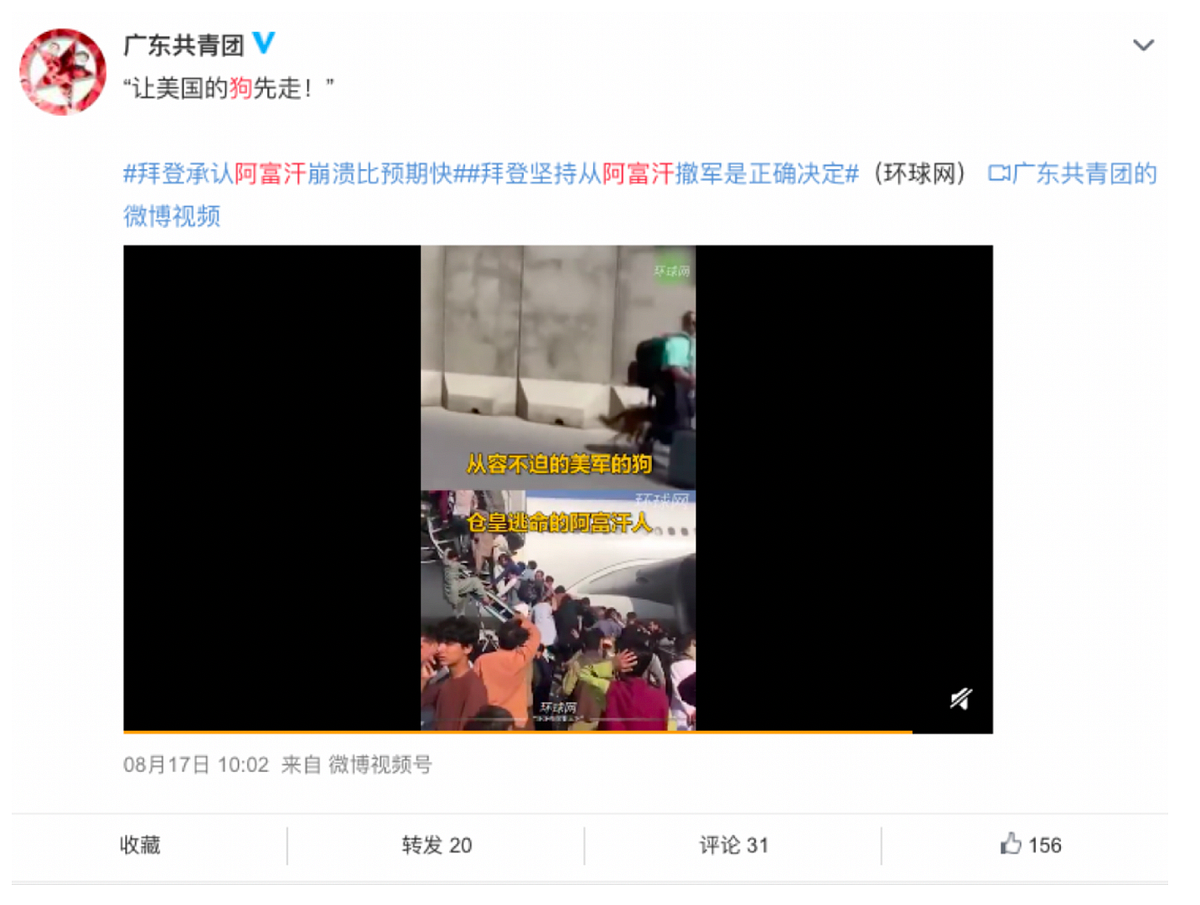
Nationalistic Weibo accounts in China also highlighted scenes from Kabul airport, including video of a man falling to his death from a military plane as it takes off that Russian media outlets also amplified. That video — or screencaps from it — ultimately went viral on Weibo. For example, one post to an individual Weibo account from August 17 received almost 3,600 likes, 300 reposts, and over 500 comments.
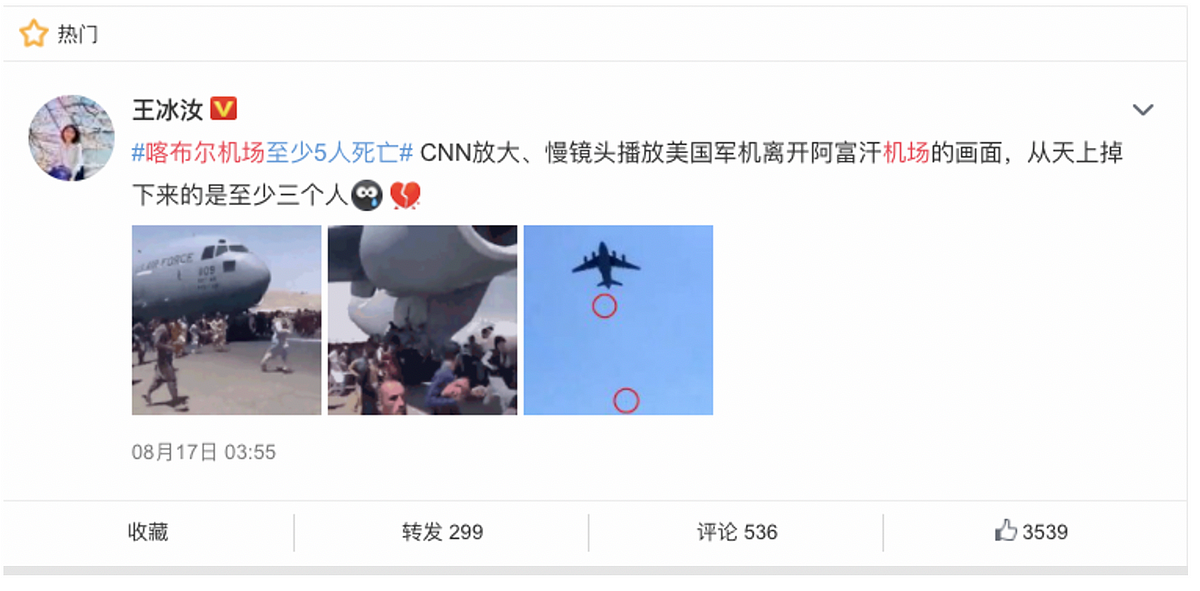
Another post juxtaposed the image of US troops departing the airport and a service dog sitting in a plane seat with the comment: “The military have all gone home! Such great human rights!”
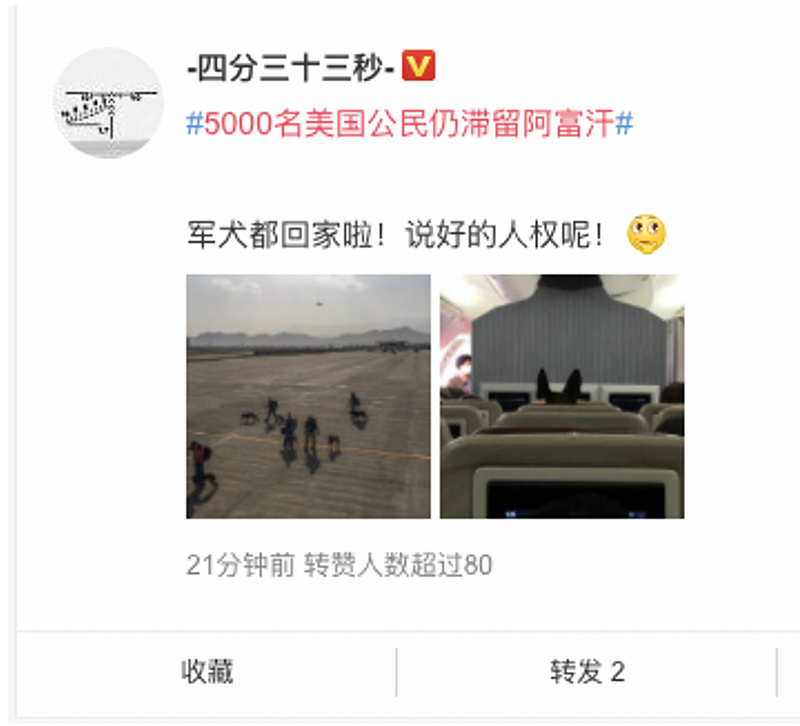
On Twitter, China’s “wolf warrior” diplomats and officials also retweeted memes and images from the Kabul airport, using them to depict the United States as inhumane, hypocritical, and corrupt. In one example, Zhang Heqing, cultural attaché to the Chinese Embassy in Pakistan and known “wolf warrior” diplomat, tweeted an image of Wikileaks founder Julian Assange claiming “the purpose of the US war in Afghanistan is money laundering.”
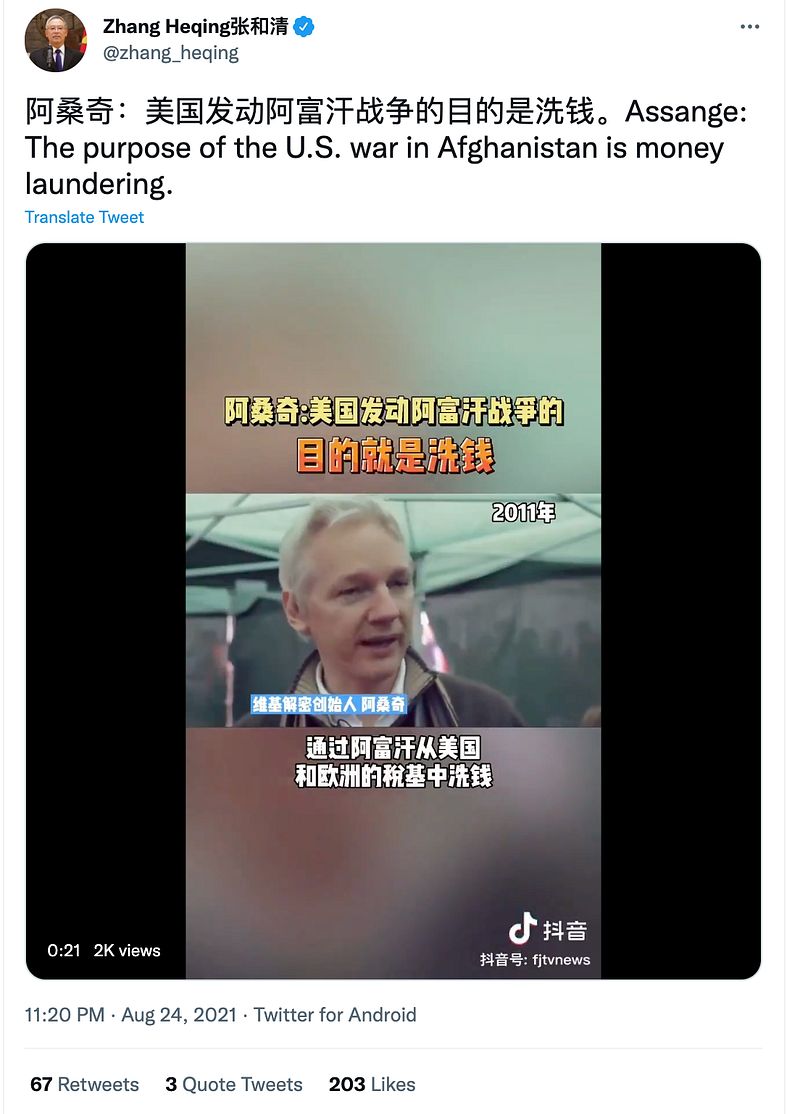
Other officials on Twitter took the opportunity to draw parallels to Vietnam in 1975 and launch a larger criticism of US “interventionism” as a human rights violation. Foreign Ministry Spokesperson Hua Chunying tweeted that US failure in Afghanistan was due to its lack of “approval” from the people in the countries in which it intervenes. A follow-on tweet drew parallels to Vietnam, with the caption “let Saigons be bygones.”
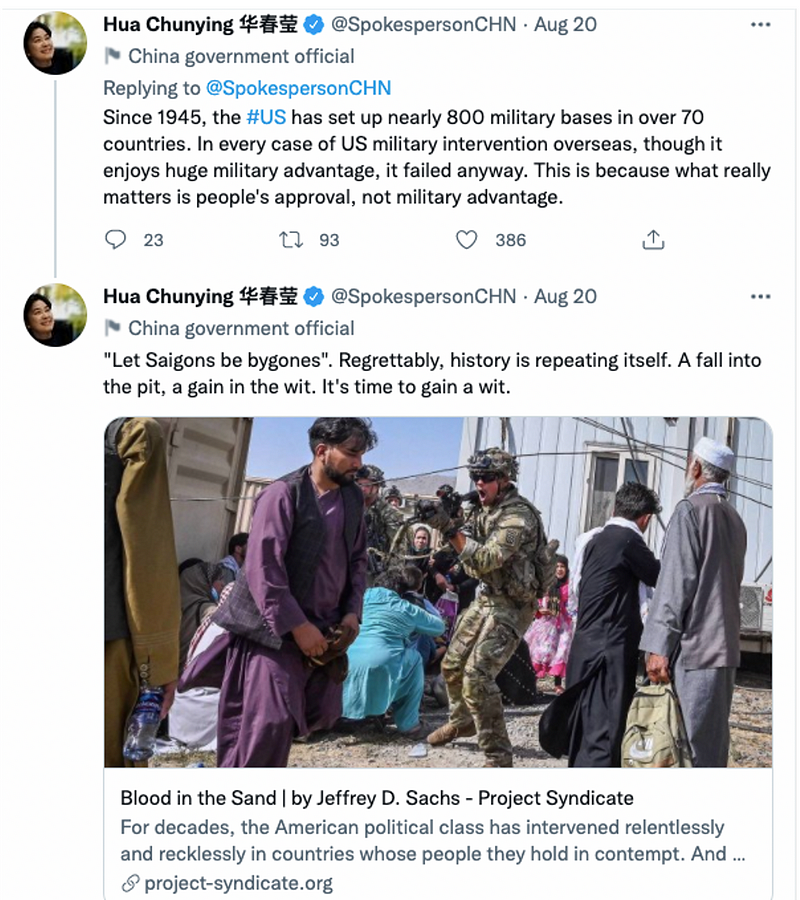
Conclusion
In the first days of the US evacuation from Afghanistan, Russia and China leveraged the opportunity to promote narratives designed to undermine US claims toward global leadership. Officials and state-affiliated media in both countries pushed narratives emphasizing a “chaotic” US exit, spreading select images of the scenes at the Kabul airport in particular as evidence of US “decline” and highlighting China and Russia’s roles as stabilizing powers in the region. Both countries also used the chaos to try to scare US-aligned nations (e.g., Ukraine and Taiwan) with the notion that they will face the same fate if they continue to rely on US support.
Both Russia and China also seized the opportunity to push the theme of US hypocrisy over human rights, paying particular attention to images of Afghans crowding at the Afghan airport along with manufacturing outrage over the calm evacuation over service dogs.
The narratives identified suggest a shared desire on the part of both China and Russia to undermine faith in US moral and political leadership on the world stage. While such aims are not new, Beijing and Moscow were able to capitalize on the US withdrawal, activating state media outlets and officials in the immediate aftermath of the events in Afghanistan to quickly disseminate their own version of events, one designed to promote their own authority at the expense of the United States.
Kenton Thibaut is China Fellow at the DFRLab.
Roman Osadchuk is a Research Assistant, Eurasia, with the DFRLab.
Cite this case study:
Kenton Thibaut and Roman Osadchuk, “China, Russia frame US as human rights “hypocrites” in wake of Afghanistan withdrawal,” Digital Forensic Research Lab (DFRLab), September 7, 2021, https://medium.com/dfrlab/china-russia-frame-us-as-human-rights-hypocrites-in-wake-of-afghanistan-withdrawal-96a937146edb.
Follow along for more in-depth analysis from our #DigitalSherlocks.

